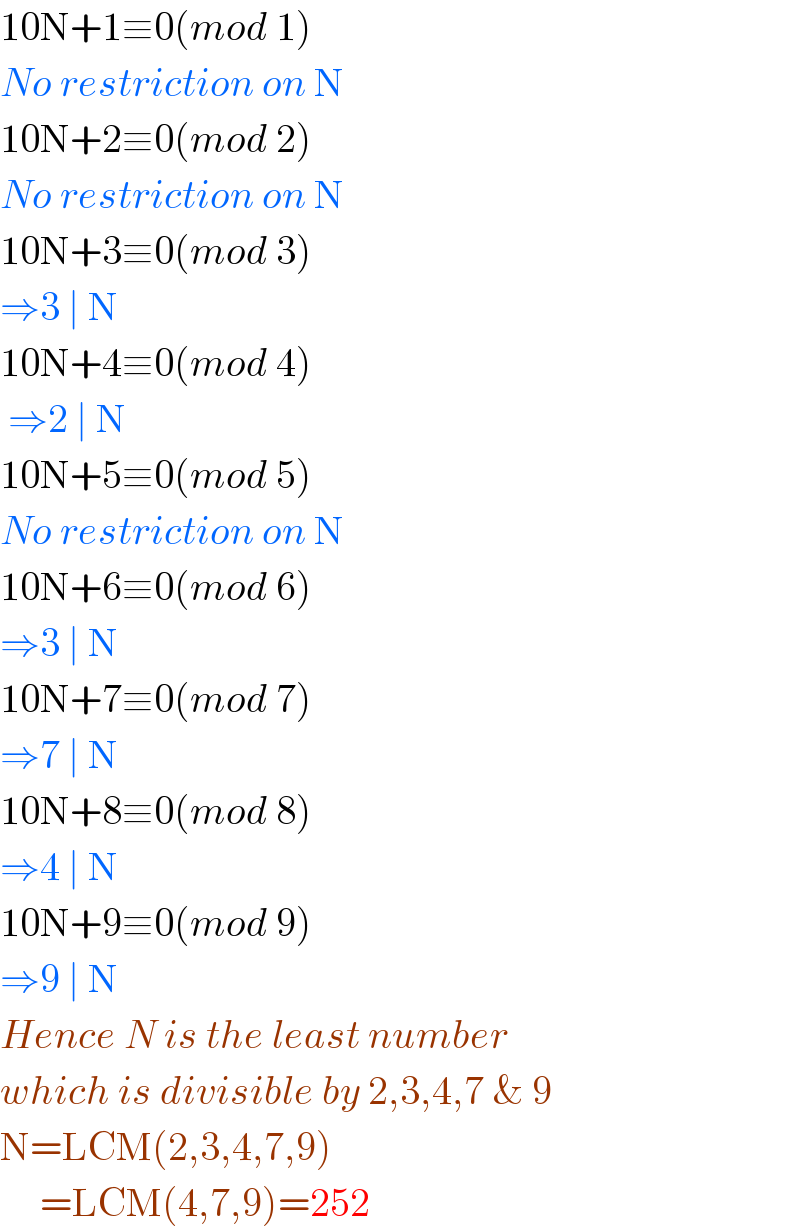Question Number 113508 by Lekhraj last updated on 13/Sep/20

Commented by mr W last updated on 13/Sep/20

$${i}\:{got}\:{N}={LCM}\left(\mathrm{5},\mathrm{7},\mathrm{8},\mathrm{9}\right)=\mathrm{2520} \\ $$
Commented by Rasheed.Sindhi last updated on 13/Sep/20

$$\:\:\:\:\:\:\:\:\:\:\:\:\:\:\:\:\:\:\:{N}=\mathrm{252} \\ $$
Answered by Rasheed.Sindhi last updated on 13/Sep/20

$$\mathrm{10N}+\mathrm{1}\equiv\mathrm{0}\left({mod}\:\mathrm{1}\right) \\ $$$${No}\:{restriction}\:{on}\:\mathrm{N} \\ $$$$\mathrm{10N}+\mathrm{2}\equiv\mathrm{0}\left({mod}\:\mathrm{2}\right) \\ $$$${No}\:{restriction}\:{on}\:\mathrm{N} \\ $$$$\mathrm{10N}+\mathrm{3}\equiv\mathrm{0}\left({mod}\:\mathrm{3}\right) \\ $$$$\Rightarrow\mathrm{3}\:\mid\:\mathrm{N} \\ $$$$\mathrm{10N}+\mathrm{4}\equiv\mathrm{0}\left({mod}\:\mathrm{4}\right) \\ $$$$\:\Rightarrow\mathrm{2}\:\mid\:\mathrm{N} \\ $$$$\mathrm{10N}+\mathrm{5}\equiv\mathrm{0}\left({mod}\:\mathrm{5}\right) \\ $$$${No}\:{restriction}\:{on}\:\mathrm{N} \\ $$$$\mathrm{10N}+\mathrm{6}\equiv\mathrm{0}\left({mod}\:\mathrm{6}\right) \\ $$$$\Rightarrow\mathrm{3}\:\mid\:\mathrm{N} \\ $$$$\mathrm{10N}+\mathrm{7}\equiv\mathrm{0}\left({mod}\:\mathrm{7}\right) \\ $$$$\Rightarrow\mathrm{7}\:\mid\:\mathrm{N} \\ $$$$\mathrm{10N}+\mathrm{8}\equiv\mathrm{0}\left({mod}\:\mathrm{8}\right) \\ $$$$\Rightarrow\mathrm{4}\:\mid\:\mathrm{N} \\ $$$$\mathrm{10N}+\mathrm{9}\equiv\mathrm{0}\left({mod}\:\mathrm{9}\right) \\ $$$$\Rightarrow\mathrm{9}\:\mid\:\mathrm{N}\: \\ $$$${Hence}\:{N}\:{is}\:{the}\:{least}\:{number} \\ $$$${which}\:{is}\:{divisible}\:{by}\:\mathrm{2},\mathrm{3},\mathrm{4},\mathrm{7}\:\&\:\mathrm{9} \\ $$$$\mathrm{N}=\mathrm{LCM}\left(\mathrm{2},\mathrm{3},\mathrm{4},\mathrm{7},\mathrm{9}\right) \\ $$$$\:\:\:\:\:=\mathrm{LCM}\left(\mathrm{4},\mathrm{7},\mathrm{9}\right)=\mathrm{252} \\ $$
Commented by mr W last updated on 13/Sep/20

$${nice}\:{solution}\:{sir}! \\ $$
Commented by Rasheed.Sindhi last updated on 14/Sep/20

$$\mathcal{T}{hanks}\:\boldsymbol{{sir}}! \\ $$
Commented by Lekhraj last updated on 14/Sep/20

$${T}\mathrm{hanks}\:\mathrm{sir}\:\mathrm{for}\:\mathrm{correction} \\ $$
